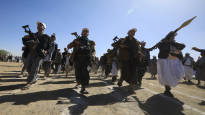The Houthis, who disrupt maritime traffic, declare that they will attack ships connected to the United States and Israel in both the Indian Ocean and the Mediterranean.
The Houthi rebels who hold power in northern Yemen seem to be consolidating their positions in the tense world situation in the Middle East. Iran-backed rebels are vying for control of Yemen against the Saudi-backed government.
Negotiations on the Gaza ceasefire are in progress and Iran and Israel are in danger of drifting into a new spiral of revenge after the April hostilities.
In April, the Houthis took a two-week break from their drone and missile attacks on ships operating in the Red Sea. Now, in addition to ships connected to Israel, American and British ships are also being targeted. The countries have sent their ships to repel Houthi attacks in the Red Sea.
The Shiite Houthis form a minority in predominantly Sunni Yemen of 21 million people. However, the weight of the group is greater than its size. There are estimated to be around 100,000 Huthi fighters, evaluated, among others, by the American TV channel CBS in January.
In this story, we tell how the power of the Houthis is growing in the region.
In the direction of the Mediterranean Sea and the Indian Ocean
Shipping companies have had to reroute their cargo ships through, for example, the southern tip of Africa, in fear of Houthi missile strikes.
The disruption of sea routes has thus been successful in the Red Sea area. Houthi military spokesman Yahya Saree announced on Friday that in the future the operating area will be extended to the Mediterranean.
– Escalation starts immediately. Its target is the ships connected to Israel, which aim at the ports of the occupied Palestinian territories from the Mediterranean side, the spokesperson told the news agency AFP.
The nearest Israeli ports are located about 2,000 kilometers from the northern parts of Yemen, so for now it is unclear how likely Houthi attacks on the Mediterranean are.
The Houthi rebels are known to have missiles with a range of 1,600-1,900 kilometers in their arsenal. The Iranian Shahed-136 drones can cover a distance of about 2,000 kilometers at their longest.
The Houthi leadership announced earlier last week that attacks can also be carried out in the Indian Ocean. However, with military spokesman Yahya Saree, the most important destination is still the Red Sea and the Gulf of Aden.
Attacks on merchant ships increased popularity
Yemen’s Houthi rebels launched attacks at sea in November as a show of support for the Palestinian extremist organization Hamas, which launched an attack on the Israeli side in October. As a result of the terrorist attack, Israel launched a large-scale military operation in Gaza.
The Houthis control the northern part of the divided Yemen and the capital Sanaa. Jamming ships has increased the group’s popularity in the areas it controls.
German Deutsche Welle radio channel interviewed a US State Department security analyst and resource center director earlier this month Hisham al-Omeisya.
– Their support has increased as a result of supporting the Palestinians in Gaza. Now they are taking advantage of the tailwind and heading to new areas to recruit more members, comments Hishan al-Omeisya.
He reminds that Yemen is still one of the poorest countries in the world. The money that goes into weapons and equipment is away from Yemenis suffering from food shortages and poor health care.
On Monday of this week, 200 aid organizations appealed for about three billion dollars in aid to Yemen. The need for aid is great both in the areas of the Saudi-backed Yemeni government and the Houthis.
Iran’s missiles increase strike capability
Iran is a major arming and financial supporter of the Houthis. However, arms deliveries may decrease in the future due to the tension between Iran and Israel. Iran needs weapons for its own armed forces and the Houthis are not the only group supported by Iran militarily and financially.
Russia is also interested in Iran’s weapons production. Iran delivered hundreds of ballistic missiles to Russia in February. The deal included, among other things, short-range Fateh-110 missiles from the news agency Reuters to Russia.
For now, however, there seems to be enough weaponry for Houthi attacks.
The Houthis claim to have uncovered a network of spies
The United States declared the Houthis a terrorist organization at the beginning of the year. The growing support in their own region encourages the Huthi leadership to take even more spectacular actions.
The organization’s internal intelligence also seems to be getting more efficient. On Monday, the Houthi Saba news agency reported that the Houthi movement had revealed a spying network that had been working for the United States and Israel since November and had arrested suspects.
According to Saba, there are twenty suspects. There are pictures of those arrested on social media, but the information could not be confirmed.
The leader is called a “ghost”
The success of the Houthis in disrupting sea routes is also explained by the leader who enjoys a cult reputation.
Houthi leader Abdul-Malik al-Houthi has become a hero and legend among young Huthi men. The news about the changed routes of the ships spread the word.
Al-Houth has a wider support in the Middle Eastern countries that support the Palestinians, says, among others, the US news site The Atlantic.
The spiritual and political leader of the Houthis has succeeded in raising the self-esteem of Muslim men suffering from severe unemployment and lack of prospects.
The forty-year-old Houthi leader avoids publicity and international meetings abroad. Abdul-Malik al-Houthi is indeed known by the nickname “ghost” because of his stealth.
Sources: AP, Reuters, AFP
